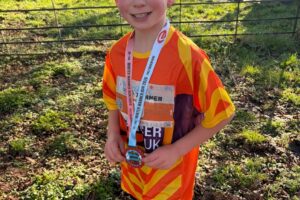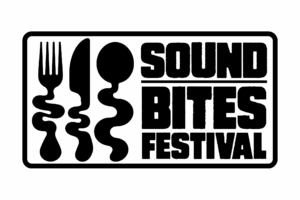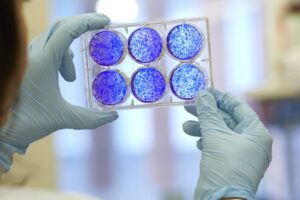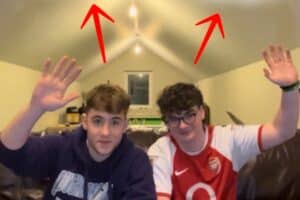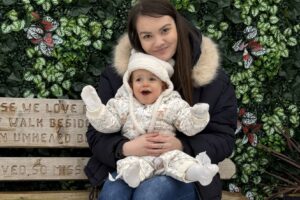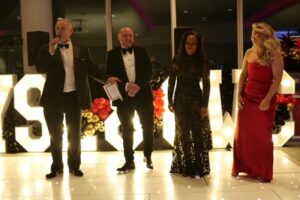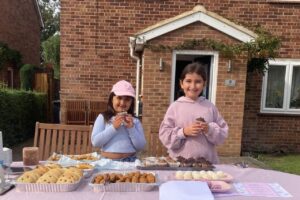Q&A: Dr. Grace Odongo on further understanding of Burkitt’s Lymphoma
Find out more about Dr Grace Akinyi Odongo research project, which aims to determine whether Epstein Barr virus (EBV) and mycotoxins are working together to deregulate epigenetics and increase cases of Burkitt’s Lymphoma, providing basis on how the risk of BL development can be reduced. Her research is funded by Children with Cancer UK under a Postdoctoral Fellowship scheme with the International Agency for Research on Cancer (IARC), which is part of the World Health Organisation (WHO). This scheme is provided to develop and support future leaders in cancer research.

We spoke to Dr Grace Akinyi Odongo, as she talks about her research project which aims to determine whether Epstein Barr virus (EBV) and mycotoxins are working together to deregulate epigenetics and increase cases of Burkitt’s Lymphoma.
Q: How and why did you become a researcher?
A: I developed interest in research during my undergraduate studies when I first did a research study. Back then and even presently I find it exciting to investigate causes or prevention of disease occurrence culminating to a healthy society.
Q: You are working on your research project that we are funding at the moment, what made you choose that as a project?
A: I have always had interest in cancer research since it’s among the diseases that contribute to significant number of deaths worldwide, thus it is important to investigate it causes so us to shed light on ways of preventing or reducing its occurrence. The project am currently working on is on childhood cancer research mainly Burkitt’s Lymphoma that is a cancer of the lymphatic system that affects B-lymphocytes. Am investigating epigenetic alterations induced by Epstein Barr Virus (EBV) or mycotoxins resulting to increased risk of endemic Burkitt’s Lymphoma carcinogenesis.
Q: What is the hardest part of your job?
A: The biggest challenge in research is unexpected outcome. Also, direct causative linkage of a specific cancer to a risk agent is challenging since there could be other contributing factors directly or indirectly.
Q: What is the most rewarding part?
The most rewarding part is revealing the unknown or adding more knowledge to what is already known with the aim of creating awareness on cancer causes and prevention.
Q: Ultimately what do you hope your research will lead to?
A: My research will provide more knowledge on epigenetic and Immunological events that occur following mycotoxin exposure and co-infection with oncogenic virus (e.g. EBV) in resulting to increased risk of carcinogenesis (e.g. endemic Burkitt’s Lymphoma). Also, the findings will form basis for future studies assessing coinfection and environmental exposure in increased risk of carcinogenesis.
Q: Who have you admired in the history of researchers/medicine and why?
A: I admire Gregor Mendel, he made one of the most important discovery of the hereditary unit called gene. I am currently studying different types of genes and am glad that someone was there before me to discover it.
Q: What advice would you give someone considering research as a career?
A: I would advise them to develop interest towards it and find a driving factor. Also, it crucial to be innovative, visualize and think beyond, read widely and be open to learning new things because every stage has a new experience. Finally, they have to be persistent and patient because nothing is instant as one has to invest their knowledge and time.
Q: What advances have you seen in your career as a researcher?
A: I have gained more knowledge and expertise in cancer research which is useful in my everyday routine research work as well as transferable back to my home country of Kenya. I have also progressively improved my scientific writing and dissemination skills evidence through my publications as years go by and in presentations in conferences/seminar. I have also been able to define my research and developed professional network around it which is important for present and future collaborations.
Q: What difference will your research hope to make to children and young people with cancer?
A: My research will provide a deeper understanding on the mechanisms used by risk factors such as environmental exposures and oncogenic viruses to contribute to carcinogenesis and exploring ways of reducing or preventing cancer occurrence as well as guide in therapeutic interventions. This will help ease the burden of cancer including childhood cancer.
Q: What do you wish that people understood better about research?
A: It is important that people understand that research is designed to solve an existing problem therefore it is done in a systematic manner with the purpose to answer predefined questions and draw a conclusion from it. However, during the research new ideas might be conceived that may be worth investigating within the framework of the initial project.
Q: In your opinion, what does the future look like for childhood cancer?
A: In my opinion, interest in childhood cancer research is gradually growing since people have realised that cancer is not only affecting the aged but as well the children and young people thus the need to research on childhood cancer and cancer in general.
Q: You are working hard to increase the survival rates of children…what is your favourite childhood memory?
A: My favourite childhood memory is the Christmas day and how we made the most out of this day. Our parents ensured we had new outfits for the day, ate our favourite dish which was chicken, rice, Chapati and a glass of fruit juice and cookies, thereafter we would go for a safari/nature walk see all the big five animals in a cage, of course to see them out of the cage you have to do a safari drive just for safety.
Q: What is the best advice you have ever been given by anyone?
A: It is a common quote; “think big, believe big, act big, and the results will be big.”
Q: How do you unwind after a day at work?
A: After a long day at work, I refresh myself, take a favourite dish then relax on the coach while watching a short movie till I fall asleep naturally, most of the time I do not know how the movie ended but there is always someone to narrate it.
Q: Do you have any message for children undergoing cancer treatment at the moment?
A: My message for the children undergoing treatment will be a quote (with insertion positive) as stated before that has worked for me; “think positive, believe positive, act positive and the results will be positive” just as you expect it to be. There is hope so never give up. You can make your story different and great if you are positive. Please know that everybody around you and away as us are doing all we can to help you fight the cancer in various ways and together we will succeed.
Learn more about Dr Grace Akinyi Odongo’s research project here:
Other stories
We have lots of information to help you learn more about childhood cancer. From specific cancer types, to treatments and causes.
